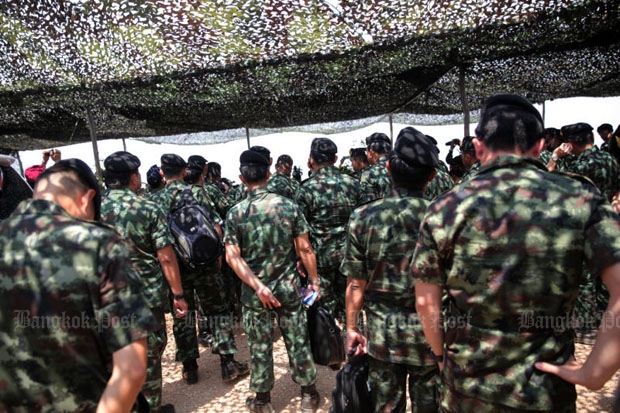
Soldiers from the rank of sub-lieutenant and up have been given police powers to summons, arrest and detain suspects in a wide range of crimes including extortion, labour abuse and human trafficking, and will also be allowed to search property without a warrant.
Under Section 44 of the interim constitution, they are authorised to search any place, seize assets, suspend financial transactions and ban suspects from travelling.
Prime Minister Prayut Chan-o-cha issued the sweeping powers late on Tuesday night, in his capacity as the chief of the National Council for Peace and Order.
Col Piyapong Klinphan, an NCPO spokesman, said Wednesday the order was aimed at preventing and suppressing certain crimes that pose a danger to public order and peace or could sabotage the economy, society and the nation.
All officers from the three armed services with the rank of sub-lieutenant and higher are now considered to be crime suppression officers and the lower ranks will assist them in their new policing duties.
They are also authorised officers under the Criminal Code and the Criminal Procedures Code, so their actions are not covered by laws relating to the Administrative Court and Administrative Court Procedure.
They are authorised to take action against a wide range of crimes under 27 laws - including extortion, abuse of labour, human trafficking, robbery, fraud, document forgery, defamation, debt collection, alien workers, gambling, immigration, child protection, tour guide services, forests, prostitution, excise taxation, price collusion, customs, loan sharking, entertainment venues and firearms.
Deputy Prime Minister and Defence Minister Prawit Wongsuwon said on Wednesday afternoon that soldiers would also act as interrogators and they were taking the crime suppression role because there were not enough police to tackle crime.
Col Piyapong said the NCPO order No. 13/2559 will allow officers to work and to deal with criminal matters more efficiently.
He denied military officers woud overuse their new powers, saying they would only target suspects already blacklisted in 16 legal violation categories that were identified during a mafia crackdown.
“This order empowers soldiers to work with officials at other agencies to a greater extent, to create 'agility' in their operations,” Col Piyapong said.
Order No.13/2559 allows soldiers to search places, individuals or vehicles if they have suspicions backed by proper evidence of flagrant offences. The law applies to suspected illegal assets or equipment used to commit a crime.
A search can also be made if an officer believes that a delay caused by obtaining a search warrant from a court will cause a targeted suspect to flee arrest or have assets moved, hidden, destroyed or changed.